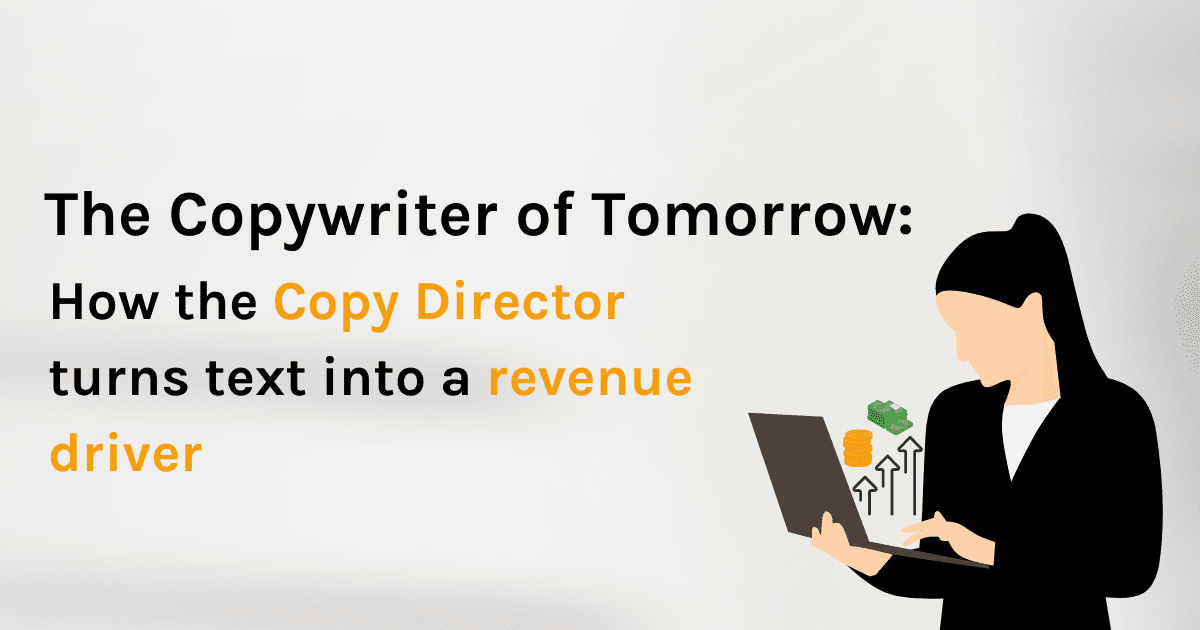The Copywriter of Tomorrow - How Companies Transform Text Into a Revenue Driver Through A Copy Director
Reading Time 8 mins | May 16, 2022 | Written by: Anne Geyer

Why Copywriters Become Copy Directors
Digitalization is changing many things in the labor market. Older professions are disappearing, while new ones are emerging. Companies also need to constantly improve their digital presence in order to remain competitive. For this purpose, they have to generate high-quality content - often in an enormous number.
Content requirements have therefore changed significantly. Content has become a key factor in revenue generation and is still on the rise. To ensure the scale of the required content output, more and more machines are used for the creation.
However, if artificial intelligence (AI) becomes increasingly active in writing for companies in the future, which tasks will copywriters be responsible for? And then what is to be done and what could the future role of copywriters in companies look like?
Journalist Arne Völker, copywriter Manuela Frenzel and I have developed the profession of tomorrow for the copywriter of today and named it Copy Director. Below, I will explain why companies will need copy directors in the future, the qualities they possess, the tasks they will have to master in the future, as well as why the text will be a measurable sales guarantor.
Copy Director - Who Are They?
First of all, companies will always need people who understand how high-quality content looks, how it is created, and what the process of content generation entails.
The question for companies is: Who can and should create my content today and in the future, and what qualifications should this person have?To me, it's clear that this position can only be filled by someone who is an expert in copywriting - a senior copywriter who can write and also possesses certain hard and soft skills.
What Qualifies a Copywriter to Be a Copy Director?
We refer to a copy director broadly, for starters, when a copywriter takes on a leadership role and outgrows the task of simply creating content.
"Seniority is the ability to judge others' output as well as your own."
Arne Völker, journalist
The transformation from copywriter to copy director is not one that begins with the guidance of other people, but with the very first project written by software. The copy director is no longer writing so much himself, but rather ensuring that high-quality content is created.
The Various Tasks of a Copy Director
Unlike the copywriter, a copy director fills several positions at once: He or she is a manager, production manager and executive at the same time. Their job involves bridging the gap between creative processes and their analytical evaluation.

The Copy Director as Manager:
The copy director monitors KPIs in his management activities and draws action strategies from them. They make sure that content is continually developed and adapted on the basis of these KPIs. The copy director knows exactly what figures are important and what measures should be taken to help increase the company's sales. The copy director keeps an eye on future developments and works out strategies that will lead to successful scaling.
As this requires communication with other business units, the Copy Director is simultaneously a cross-disciplinary interface. To monitor the effectiveness of the measures taken, the copy director maintains close contact with the sales department, for example, in order to evaluate the impact of the texts and textual measures.
To ensure an accurate assessment of the measures taken and to guarantee the continuous development of the content, the copy director also evaluates new technologies and questions, for instance, what benefits a particular software could bring to his company.
The tasks of the copy director as a manager:
- Developing content based on data
- Does not think in terms of costs, but rather drives revenue
- Assuming an interdisciplinary interface and consulting function
- Maintaining strategic focus on the future
- Evaluating new technologies
The Copy Director As Production Manager:
As production manager, the copy director is responsible for the quality management of the created content. Additionally, they examine the extent to which topics are feasible, can best be implemented, and are profitable in terms of the company.
In the future, this question will be frequently asked, particularly with regard to the increase in computer-generated and data-driven content: To what extent can content be scaled and automated? This will be answered by the copy director in the future.
Another important task is the development and research of creative content, hence the importance of the copy director having prior experience as a copywriter.
The copy director's foundation is his understanding of copywriting, his sense of text, as well as his knowledge of the creative writing process. The copy director also focuses on data-driven content and knows which key figures to consider in order to ensure the success of the company's content. The measurement of this success is achieved through the use of suitable tools.
The copy director coordinates, monitors and approves the creation of the content. He is well acquainted with the creative writing process, knows the problems involved, and can react accordingly. When it comes to content generation, the copy director has the scaling effect clearly in mind, as opposed to the editor-in-chief, for example.
The copy director's responsibilities as production manager:
- Conduct data-based content quality management
- Develop scaling and automation skills
- Research, develop, coordinate, monitor, and approve (creative) content
The Copy Director As a Manager:
The copy director then creates a creative working environment and reduces stress in order to promote creative processes.
Only in this way can employees be won over and motivated. He documents his findings and communicates them to others, whether human or machine - he guides, trains and inspires.
Regardless of whether he instructs people or has an AI writing content for him, it plays a subordinate role. The copy director communicates the goals he sets to his team, and successes across hierarchies to management levels as well as to other departments.
The copy director thus leads both professionally and in terms of personnel.
Responsibilities of the Copy Director as a technical leader:
- Communicate goals and successes through hierarchies
- Inspire the environment for work content and editing
- Documentation and communication of what has been learned
- Training people and machines
Tasks of the copy director as a personnel manager:
- Attract employees and create motivation
- Development of personnel
- Create a work environment of culture, movement, creativity, energy, and stress reduction
Hard Skills - The Competencies of The Copy Director
With so many positions and tasks, a copy director needs a whole bundle of qualities. Skilled - and this goes far beyond content creation.
He is familiar, at least in basic terms, with the following topics (this is a basic framework that is always expanding):
- Search Engine Optimization
- Project management
- Graphic design
- UX Microcopy
- Data acquisition and collection
- E-Commerce
- Digital Marketing
- Content change strategies
Soft Skills - The Qualities of The Copy Director
There is no question that the copy director possesses a great deal of curiosity and thirst for knowledge, as the various tasks involved make his job simultaneously demanding and varied, while also requiring an ever-growing reservoir of knowledge in many subject areas. The copy director tests and evaluates new tools and acquires knowledge in various subject areas - everything from data collection to user experience.
Nor does the copy director shy away from responsibility and knows how to steer and guide his team in difficult situations - whether they are people or machines.
Conclusion: From Cost Factor Copywriter to Profit Center Copy Director
The question of how companies can use the copy director to turn text into a sales driver has now been clarified and we have explained what qualifies a copywriter to be a copy director. The simple answer: experience in the field! Copy directors are experienced copywriters with a vast amount of technical knowledge and experience, as well as the necessary soft skills.
In companies, copywriters were usually seen as a cost factor, as their success and performance were difficult or impossible to measure, but the copy director is a key sales driver, as his performance is visible on the basis of corresponding key figures. It is therefore also an important task of the copy director to make the success of copywriting visible and to communicate it within the company.
Prospects And Issues
I have explained why companies need good copywriters - and why they are becoming copy directors. However, when looking at the future, a question comes to mind: How and where can copywriters still learn to copywrite when AI is increasingly doing the writing? How can then seniority be acquired, and experience gained? - This is a question I would like to open up for debate.
Furthermore, I don't think that the copy director must necessarily be employed by a company. The copy director of tomorrow, similar to the freelance copywriters of today, can also work independently. Management and leadership do not have to be the responsibility of employees.
As the copy director has a great deal of know-how and combines many tasks, a specialization in the individual areas would also be imaginable. This is especially true in view of the developments in the digital world, many of which are difficult to predict. Companies could also employ an entire team of copy directors in the future. Because one thing is clear: companies will only be successful in the future - even more so than they are now - if they constantly develop and generate top-notch content.
About The Author:
Saim Rolf Alkan is Chief Executive Officer of AX Semantics and a pioneer in the field of automated text creation. After he had worked successfully in the field of content, he decided that businesses needed a better tool: one, that would enable humans and machines to work together in creating the mass of content necessary to be successful in the digital age. Saim developed a content solution that generates high quality texts from data in 110 languages and is used in areas like e-commerce, publishing and the financial system. Furthermore, Saim is a lecturer and speaker in the field of online communication and “robot journalism” and he has written many books and numerous articles.
